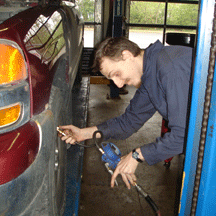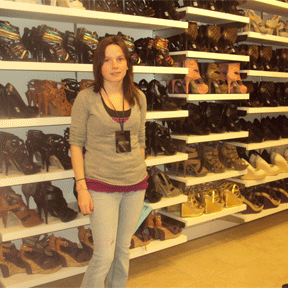Cooperative Education consists of a learning experience that is connected to the community. In co-op, students can apply what they have learned at school in the workplace setting. Ottawa Technical has amazing community partners that are able to engage our students in on the job learning, and provide our students with valuable expertise while they explore a career pathway and gain meaningful work experience.
Ottawa Technical has developed strong partnerships within the trades, providing students the opportunity to explore the apprenticeship pathway while still in secondary school. More information on the Ontario Youth Apprenticeship Program (OYAP)
Co-op .... An opportunity to try out a number of different trades & technologies and "test drive" potential career options...Visit the Co-op office to find out more!
OTSS has a rich tradition of providing meaningful workplace experiences for its students. Talk to your Guidance Counsellor to see how Co-op could become part of your educational game plan.
FAQ
Cooperative Education is a planned learning experience, for which credits are earned, that integrates classroom theory and learning experiences at a workplace to enable students to apply and refine the knowledge and skills acquired in a related curriculum course or a locally developed course.
- interview potential students
- shares expertise with students
- maintains a record of the student's attendance
- treats the student as a regular employee in training
- communicates with the teacher-monitor on a regular basis
- assists the teacher-monitor in the evaluation of the student's performance
- provides on-going feedback to the student
- provides a safe working environment and reports accidents involving the student immediately to the school.
- develops supervisory, leadership and interpersonal skills of employees
- provides opportunities to assess and recruit future employees
- gives students exposure to a variety of career options, help boost their confidence and let them build a network of references
- permits business and industry to enhance their corporate image through their direct involvement with the community they serve
assist schools in keeping courses relevant to business, technological, industrial and professional practices - encourage students to develop skills, knowledge and attitudes required for employment
- learn about their strengths, interests, and special skills
- provides career exploration and planning enhanced and enriched academic experiences
- improves their employability skills
- create better-prepared workers, and reduce time-consuming and costly recruiting, hiring and training efforts
- apply curriculum knowledge in an out-of-school setting
- learn valuable lessons such as pride in a job well done, punctuality, dependability and honesty.
- No - the emphasis in cooperative education is placed on learning.
- Cooperative education students registered as (OYAP) apprentices in trades recognized by the Trades Qualification and Apprenticeship Act may be paid wages.
- The student is covered by the Workplace Safety and Insurance Board according to the dates and times stipulated in the Work Education Agreement Form.
- The teacher will cover the procedure with the supervisor at the time of the placement.
- Students participating in a Cooperative Education program are covered by OCDSB third-party liability insurance with respect to those specific activities involved in their training.
- It is not recommended that students drive vehicles of any kind on Co-Op placements. This includes forklifts, ATVs, golf carts, snowmobiles, ride-on lawn equipment, etc., as well as vehicles licensed for the road.
- Although there may be circumstances where driving is a part of a student's expected duties, the employer must then include the student in their insurance coverage.
- The student is protected for damage caused accidentally to the property of an employer while such property is in the care, custody or control of the student.
- The school board's insurance does not protect the employer from his/her own negligence.
- Semestered school students are usually in the workplace three hours per day from mid-September to the end of January or mid-February to the middle of June.
- Students do not attend the placement during the school holidays.
- A brief description of the organization and job duties will be required. Any special skills that the student will need would be an asset. Your Placement Opportunity will be e-mailed out to all Co-Op contact teachers.
- Contact: Deirdre Stuart, Databank Administrator at (613) 596-8286 or your "neighbourhood" High School Co-Op Dept. - OTLC (745-4528)
- Posting a Placement Opportunity can be done at any time throughout the year but the preferred times are late August, December and in June.
Course Description
Making workplace connections to your future!
Consider taking Co-Op as part of your educational game plan.
Cooperative Education is a unique opportunity that links the knowledge and skills gained in a related classroom course/shop to the workplace - earning credits while learning on-the-job.
Students explore career options via hands-on experiences in business and industry worksites - gathering information and expanding their transferable skills and knowledge to make successful post high-school choices about work and further training and education.
Students gain important employability skills - including an understanding of the importance of attitude, teamwork and personal management skills in the workplace.
Co-Op runs for the full Semester - combining a 1/2 day work placements in the community with a school-based co-op classroom component.
Students usually earn 2 Co-Op credits per semester.
The Classroom Component of Co-Op includes:
Pre-Placement Orientation preparing for the work placement
- Integration - activities and discussion that help make connections between the workplace learning and the Co-Op link course(s)
- Reflection - chance to reflect on and share your Co-Op experiences and their impact
PPLP - during the pre-placement period, Co-Op teachers meet with each student to begin developing the student's personalized placement learning plan (PPLP)
The Placement Component of Co-Op provides students with the opportunity to:
- expand and apply the knowledge and skills learned in a school subject /shop in a workplace setting
Key Learning Outcomes
A. Classroom Component
- Job Readiness
- Health & Safety
- Rights & Responsibilities
- Self-Assessment
- Reflective Learning
- Workplace Opportunities & Challenges
B. Placement Component
- Key Learning Outcomes of Related Course that apply to the co-op work placement
- Site-specific knowledge, skills, and abilities
Assessment
A.1. Pre-Placement Orientation:
- Interview with employer
- Resume, cover letter
- Safety quiz & site safety check
- Employee rights and responsibilities
A.2. Integration & Reflection:
- Weekly logs with evidence of learning
- Independent career research project
- Exit resume
B. Placement:
- Performance Appraisals by Employer (3)
Evaluation
70% Class Work: = 70/100
(tests, presentations, research projects, assignments, portfolio, personal profile)
Pre-Placement (15%) = 15/100
Integration (20%) = 20/100
Placement (65%) = 45/100
30% Summative: = 30/100
Independent Presentation:
Making Connections, Analysis (I,C) Evidence of Learning in key areas (I) Reflections on Evidence (I) Report Presentation = 15/100
Interview Reflection/Career Insight (K,C) = 10/100
Employment Exit package support (I, C) = 5/100
Weighting of Achievement Categories
The classroom component - Class work and final 30% evaluation will be assessed and evaluated based on the following weighting of the Achievement Categories:
Knowledge/Understanding - 40%
Thinking/Inquiry - 25%
Communication - 20%
Application - 15%
Learning Skills - will be assessed and recorded on the report card. They are an integral part of student learning and include:
- Work habits
- Teamwork
- Organization
- Initiative
- Working independently
Teaching & Learning Strategies
Different strategies will be used throughout the course to help meet the needs of a variety of learners.
The placement is experiential hands-on learning. Students have the chance to apply the skills and learning from their related course in the workplace.
At specific times during the Co-Op term, students meet regularly at the school to discuss their experiences, reflect on their progress and determine their next steps for learning in the workplace. They also reflect on the impact of these experiences on their future career, education and training plans.
Student Info/Activities
The Facts
Frequently Asked Questions about Co-op
Q. What do I have to do to become a Co-op student?
- On your Course Option sheet , be sure to choose "Co-op" for two sections
- Complete a Co-op Registration form and submit to the Co-op Office by the deadline
- Attend your scheduled Co-op Interview
Q. What identifies a good Co-op candidate?
- Evidence of maturity and a positive attitude
- Good attendance record
- Willingness to learn
- Appropriate educational background for the type of placement requested
- Successful Work Experience 10 placements
- Respect for policies and procedures of the school and workplace expectations
Q. What is meant by a "Subject Link Course"?
Your 2-credit Co-op course must be linked to a subject you have already passed or one you will be taking the same time as your Co-op course. You will link some of the expectations of this subject to your activities at your Co-op placement.
Q. How do I select my Co-op work placement site?
By looking at your Subject Link course, your interests & career plans - your Co-op teacher will work with you to identify an appropriate work placement. A listing of previous Co-op work placements is available in the Co-op office for you to look at - also check out the Co-op Bulletin Board and Photo Gallery for pictures of previous Co-op students at their worksites. You may have some ideas/suggestions of your own. Co-op teachers try to meet your placement choices but have some back-up ideas in mind.
Q. When do I find out about my placement?
During the first two weeks of the semester all Co-op students are in school doing Pre-Placement activities. During that period of time you will be informed and an interview will be arranged with the Co-op employer.
Q. What about health tests, Criminal Record Checks, etc.?
Depending on the placement, you may have to have TB tests or a Criminal Record Check completed prior to the start of some placements - e.g. Daycare Centres.
Q. What is Pre-Placement Orientation?
The first two weeks of the Co-op Term involves "getting ready" for Co-op and includes such things as health & safety in the workplace, self-assessment, first aid, preparing resumes, interview skills and understanding Co-op & employer procedures and expectations.
Q. What's a PPLP?
A Personalized Placement Learning Plan (PPLP) is your Co-op "game plan" - a document built and updated by you, your Co-op teacher, and worksite supervisor that helps to ensure Co-op is a meaningful experience that links your classroom skills & knowledge to their application in the workplace.
Q. What are Integration/Reflection Days?
Integration Days are scheduled throughout the term - you will report back to the school on those days to share and reflect on your Co-op experiences, develop further skills, & complete and present assignments.
Q. Am I paid for my Co-op work?
Students are not paid while on the job during the hours outlined on the Work Education Agreement. The possibility does exist for employers to hire Co-op students outside these WEA Co-op hours - e.g. on the weekend. OYAP students are often provided some sort of 'payment' - which could be in the form of tools, a bus pass, wages, etc.
Q. How will I be evaluated?
Your term will be worth 70% and your final projects/activities will be worth 30% of your mark. For a complete breakdown of assessment and evaluation click here. Both your worksite supervisor and Co-op teacher will evaluate you.
Q. What will my work schedule be?
Your work schedule will be determined during your interview with your placement supervisor. Co-op is timetabled either all morning or all afternoon. Normally plan on 3 Co-op hours/day - e.g. 8:30 - 11:30 am or 12:30 - 3:30 pm.
Q. Will I be insured?
All Co-op students are covered by the Workplace Safety Insurance Board through the Ministry of Education. A Work Education Agreement will be prepared by the Co-op Dept. and the form must be signed by your, your parent (if you are under 18), your placement supervisor and your Co-op teacher prior to beginning work at your placement. Further Information
Q. What about transportation?
Transportation to and from your Co-op worksite is your responsibility. Our School Board does NOT provide insurance coverage or support students driving motorized vehicles while working at your Co-op placement. Further Information
Q. What about attendance?
You will be treated like a regular employee. You will be expected to notify your Co-op placement supervisor when you will be absent. You must also notify your Co-op teacher. Remember: attendance and punctuality are important employability skills.
CO-OP Registration
Take the following steps to be included in Co-op as part of your plans for the coming school term:
- Double-Check with your Guidance Counsellor that you have selected "Co-op" on your Option sheet
- Complete a Co-op Registration Form and submit to the Co-op Office by the deadline
- Attend your scheduled Co-op Interview
Assignments/Activities
As outlined in the Co-op Course Description, Co-op includes participating in the following presentations & training and completing the following assignments and activities:
Supporting Links:
- Freedom of Information & Privacy
- Ontario Human Rights Commission
- Young Workers Awareness Program
First Days
Several important tasks must be completed during the first couple of days of Co-op
- Co-op Contract / Insurance Signatures
- Student, Parent, Employer signatures on Work Education Agreement and Insurance Form
- Return to Co-op Office
- Worksite Safety Survey
Integration Sessions
** Remind your Co-op Employer that you will be at school on these dates and not at Co-op.
Co-op Reflections
During the Term, complete the Co-op Reflections by their DUE DATES and bring them to the monthly Integration Sessions. The Co-op Reflections will be assessed using the following outline:
- Co-op Reflections Assessment
Integration Topics
- The following topics will be explored during the integration sessions:
- Union Panel Presentation (Bricklayers, Electrical, Plumbers & Pipefitters)
- Employability/Personal Management Skills
- Learning Skills Assessment
- Career Exploration
Independent Study Project
Post CO-OP Summary & Sharing Opportunities:
- Co-op Poster Project I.S.P.
- or OYAP Poster Project I.S.P.
- Poster Assessment
- Employer Thank-You Letter
Log Sheets:
Every week during your Co-op term you need to complete a Log Sheet where you track the Co-op hours you have logged at the worksite for that week as well as a summary of the key tasks you have been involved in at your placement.
Each Weekly Log Sheet requires:
- Hours worked each day
- Summary of key tasks
- Areas requiring improvement
- Total # hrs. worked
- Absences/lates
- Employer comments
- Student Signature
- Employer Signature
Submit these to the Co-op Office by WEDNESDAY of the following week. The Log Sheets will be assessed using the following outline:
- Log Sheet Assessment
Employer Information
School-to-Work Programs such as Co-Op provide students with a series of opportunities to learn about the world of work, explore potential careers, and gain valuable work experience. These planned learning experiences assist students, whether bound for college, apprenticeship or directly to work, to make informed decisions and to develop the knowledge, skills, and attitudes that are essential in today's society.
All senior students at Ottawa Technical Secondary School are encouraged to include Co-Op Education in their course planning - allowing them to extend their classroom learning at supervised placements in the community.
The involvement/partnership of employer worksite hosts underlies this program's success.
If you are an employer interested in more information about the Cooperative Education Program at OTSS, please contact the Co-Op Office at: (613) 745-4528.
Helping students make workplace connections to their future!
Benefits to Employers
- Train, access and recruit future employees
- Enhance company image in the community
- Develop supervisory skills in employees
- An opportunity to demonstrate community involvement
- Heighten student awareness of workplace expectations and career opportunities
Placement Responsibilities
- Conduct an interview prior to placement
- Assist with the development of personalized placement learning plan - outlining employer expectations and worksite tasks
- Sign the Workplace Education Agreement and Safety Insurance Coverage Forms
- Provide orientation and workplace health and safety practices/procedures
- Assess, evaluate and provide direction and encouragement for student improvement
- Weekly log/time sheets are to be signed off by the worksite supervisor
- 3 employer performance assessments are completed per term
CO-OP Schedule
- There are two Co-Op terms per School Year: September - January and February - June
- Students are normally at their Co-Op worksite a minimum of 3 hours per day AM or PM, Monday to Friday.
- Students report back to school 4 times per term for 1-day integration / reflection activities and at the end of the term for Final Reflection activities.
- Students are expected to contact both their Co-Op employer and the school regarding any absences.
CO-OP Department
Welcome to the Co-op Department!
Co-op Office
Phone 613.745.4528
Fax 613.745.8234
Co-op Staff - "Bridging School to Work"
The Co-op Department staff is available to help you Monday - Friday
( 8:00 AM - 3:30 PM) with any questions / concerns regarding:
- Co-op opportunities
- OYAP opportunities
- Work Experience
- Adult Programs
- Potential part-time job opportunities
- Resume assistance
Drop by and talk to us about your future!
Employer Benefits
Hands-On Learning Benefits Students & Employers!
Benefits for Employers
- Students look to schools to teach them academic and workplace skills.
- Students look to employers to give them a chance to prove themselves in real-life work settings.
- There are numerous benefits for employers who offer students work experience.
Building the Talent Pool
- Work experiences create better-prepared workers, and reduce time-consuming and costly recruiting, hiring and training efforts.
- Work experiences help enhance the work ethic in students, and provide valuable lessons, such as pride in a job well done, punctuality, dependability and honesty.
Boosting the Employee Satisfaction Quotient
- Employees who work with students gain new leadership and interpersonal skills.
- Employees say their morale is improved and they enjoy the enthusiasm of youth.
- Work experiences reinforce the organization's commitment to its workers and their families, by benefiting the children of employees.
It Makes Economic Sense
- Youth unemployment is persistently higher than the adult rate, while employers scramble to find good and committed employees.
- Giving students work experience helps promote a variety of career choices.
- It also enlarges the pool of qualified workers in sectors with shortages of skilled employees.
Stronger Communities, Better Schools
- When employers team up with schools, the exchange of information and expertise helps enhance the curriculum and integrate classroom and workplace learning.
- Students benefit when employers and schools work together.
- Co-operation instils a strong sense that "this is my community".
The Bottom Line
When students make a successful transition from school to work, it's good for all of us - our society, our economy, our workplaces, and, most of all, our students.
Source: Passport to Prosperity: The Provincial Partnership Council, Ontario Ministry of Education, Ontario Ministry of Training, Colleges and Universities
Hands-On Learning Benefits Students & Employers!
Staying in School
- When students see the possibilities and understand the knowledge and skill requirements of various career options, they are more motivated to stay in school and complete their education.
- Students see the link between what they learn in the classroom and how it is applied at work.
- Students gain confidence, skills and on-the-job experience
Bringing Careers to the Classroom
- Students get a chance to explore a number of career options.
- A connection with business/industry can bring the curriculum to life.
- Practical information about current career practices and market demands can make lessons more relevant and exciting for students.
- The importance of academic learning and literacy (including skills in communication, mathematics, science and technology) takes on new meaning for students.
- In the workplace, students are exposed to successful adult role models and mentors.
Launching the Job Search
- Students build a network of potential future employers and a source of references.
- Students gain workplace experiences, which are essential for their future job searches.
- With first-hand knowledge, students may be more willing to pursue careers in sectors experiencing shortages of skilled workers.
Students Taking Charge of Their Future
Students find their own lessons and inspiration from work experiences.
However, one thing that they all share is a belief that work experiences will help give them an edge in their pursuit of future success.
Source: Passport to Prosperity: The Provincial Partnership Council, Ontario Ministry of Education, Ontario Ministry of Training, Colleges and Universities
Ontario Youth Apprenticeship Program (OYAP)
Earn high school credits while training as a registered apprentice in the trade of your choice.Minimum entry requirements:
- 16 yrs. of age; 16 credits
- demonstrated competency in the trade-related subject(s)
- educational plan that ensures graduation requirements and apprenticeship prerequisites are met
- serious attitude and commitment to their apprenticeship goal
Ottawa Technical Secondary School
Jump Start your apprenticeship in a variety of trades through hands-on training under the supervision of a qualified journeyperson. Potential trades include:
- Auto body Repair
- Automotive Service Technician
- Baker
- Early Childhood Education
- Cook
- Electrician
- General Carpenter
- Hairstylist
- Landscaper
- Small Engine Technician
- Welder





